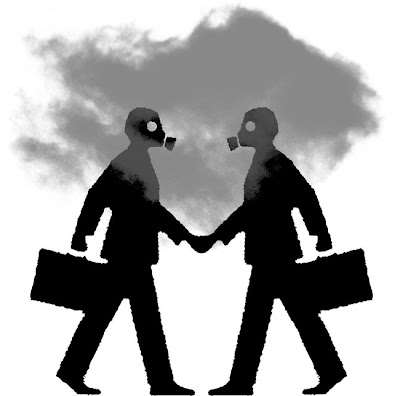
AFGHANISTAN-VIETNAM. In Worse Than Vietnam, Robert Wright points out that the Afghanistan War has become America's longest military conflict, having now lasted over nine years. Many (including this writer) have pointed out the clear parallels with the Vietnam War, in which the U.S. made the classic blunder of fighting a conventional war against guerrillas defending their homeland from foreign invaders (us). Shades of the American Revolution. In both wars, the puppet regime we supported was corrupt and inept (descriptors which I normally reserve for Republicans and Democrats, respectively). In both wars, enemy combatants had decades of experience, and were led by brilliant strategists. And in both wars, the light at the end of the tunnel kept receding.
Wright perceives several important differences between the two conflicts, differences which in his view make Afghanistan a much more deadly and hopeless quagmire. Among his points:
- Vietnam, in spite of the waste of lives, money and morale which it imposed on the country, was a relatively small war. More importantly, Vietnam had no potential for generating more and more enemy combatants whose reach could extend to American soil. Afghanistan does. The 9/11 attacks were a demonstration not only of the possible consequences for the American homeland, they were a deliberate ploy by Osama bin Laden to lure the U.S. into a war it could not win. And like one of Pavlov's dogs, we took the bait.
- Both wars were begun to contain a hostile force -- communism and terrorism, respectively. And in each case, "the mistake was in overestimating the intrinsic power of that force. In the case of communism .... our enemy had wed its fate to an economic system that was bound to drag it further and further behind us. All we really had to do was stay vigilant and wait for it to self-destruct. So too with jihadism. Al Qaeda's ideology offers nothing that many of the world's Muslims actually want -- except, perhaps, when they feel threatened by the West, a feeling that isn't exactly dulled by the presence of American troops in Muslim countries.
- "Still, the strategy in whose name both wars were launched, containment, makes sense if wisely calibrated. A well-tuned terrorism containment strategy .... would require strong leadership in the White House and in Congress. It would mean convincing Americans that, sometimes at least, we have to absorb terrorist attacks stoically, refraining from retaliation that brings large-scale blowback. That's a tough sell, because few things are more deeply engrained in human nature than the impulse to punish enemies. So maybe the message should be put like this -- Could we please stop doing Al Qaeda's work for it?"
Wright's suggestions are consistent with my own views, expressed with some frequency on this forum. Containing terrorism has already been proven effective when performed by small groups of Special Forces and Delta Force operatives, in alliance with local tribal leaders in Afghanistan. (As an illustration, see the book The Mission, the Men, and Me by Pete Blaber, a former Delta Force commander.) Trying to impose American will on the region with large numbers of conventional forces, in alliance with purported national leaders who don't even enjoy the support of their own fractured federations of tribal, ethnic and religious leaders, is a recipe for prolonged disaster.
NOTE: There is one aspect of U.S. presence in both Vietnam and Afghanistan which Wright fails to take into account -- our acquisitive greed for natural resources. In Vietnam, it was rubber and oil. In Afghanistan, it is oil, natural gas, and the control of opium. Until we hold these ulterior motives up to the light of day, we will never fully understand our own contribution to the problem.
CLIMATE CHANGE. In To Fight Climate Change, Clear the Air, the authors wrestle with the intractable problem of getting nations to agree on long-term solutions to reduce carbon dioxide emissions that contribute to global warming. They suggest that as negotiations proceed, it would make sense to also focus on short-term, attainable solutions, including reducing emissions of three short-lived gases (methane, hydrofluorocarbons and lower atmospheric ozone), as well as reducing dark soot particles, pollution which results from the incomplete combustion of hydrocarbons. These short-term targets are equivalent to about 80 percent of the global warming impact of carbon dioxide alone, so including them in local and international negotiations makes tremendous sense.



No comments:
Post a Comment